Aerobic & Anaerobic Respiration | Science Class 10 PDF Download
Respiration
- The process of respiration involves taking in oxygen (of air) into the cells, using it for releasing energy by burning food, and then eliminating the waste products (carbon dioxide and water) from the body.
- Or the process of acquiring oxygen from outside the body and using it in the process of break-down of food sources for cellular needs is called Respiration.
C6H12O6(Glucose) + 6O2 → 6H2O + 6CO2 + Energy(in the form of ATP)
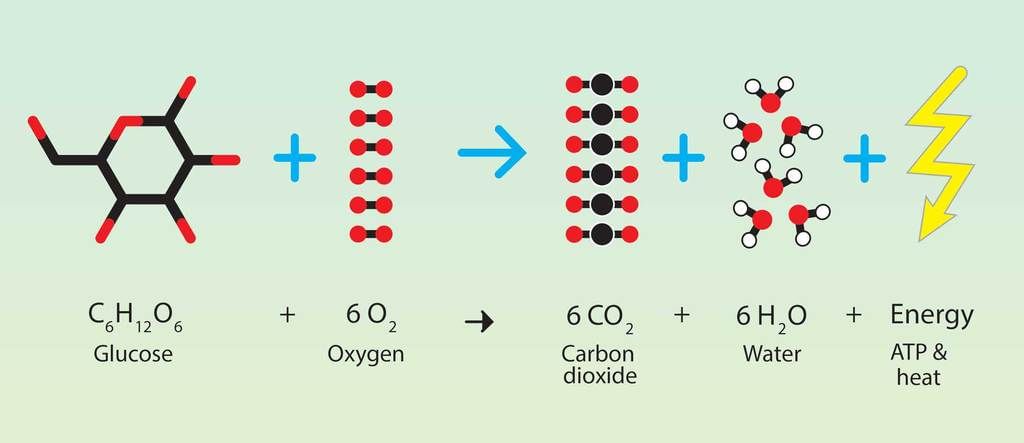 Cellular Respiration
Cellular Respiration
- Respiration is actually a biochemical process that occurs in stages and requires many enzymes.
- In cells, cellular respiration is the pathway of yielding energy in the form of adenosine triphosphate (ATP). Both eukaryotic and prokaryotic cells undergo cellular respiration. Depending upon the oxygen demand, cellular respiration is of two types- aerobic and anaerobic respiration.
Types of Cellular Respiration
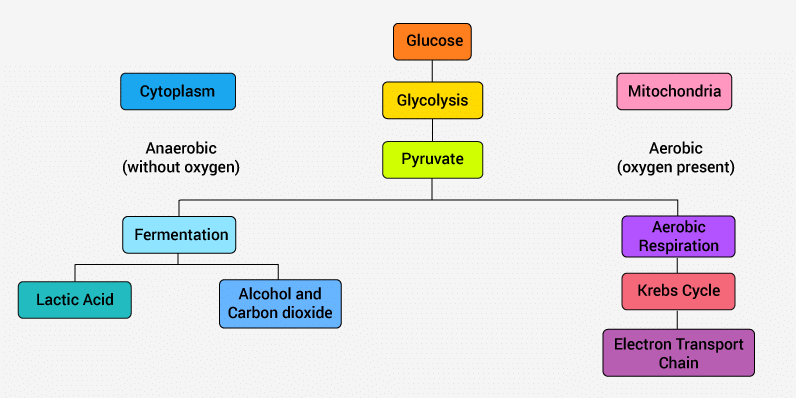
Aerobic Respiration
- Aerobic respiration is the burning or oxidation of glucose in the presence of oxygen to release energy (ATP).

- The whole process of aerobic respiration takes place in three steps: glycolysis, Krebs’ cycle, and electron transport system. Sites of respiration are cytoplasm and mitochondria.
Mechanism of Aerobic Respiration
The mechanism of respiration involves the following two processes:
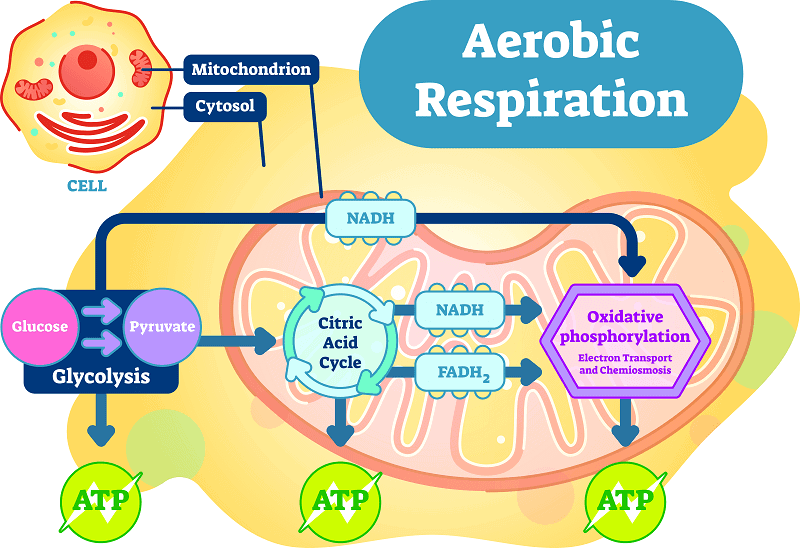
(a) Glycolysis
Series of reactions which does not require oxygen and by which glucose molecule is broken into pyruvic acid.
- Aerobic Respiration involves the stepwise breakdown of glucose by a series of reactions in which the energy is released in some of the exergonic steps.
- Glucose, the most common respiratory substrate, may be broken either aerobically or anaerobically. Both processes start the same way by using the anaerobic reaction pathway called glycolysis.
- Under aerobic conditions, glycolysis products are completely oxidised, and CO2 and H2O are formed as the end products, and under anaerobic conditions, alcohol or lactic acid, CO2 is produced.
(b) Breakdown of Pyruvic Acid Molecules: By aerobic (in the presence of oxygen) or anaerobic (in the absence of oxygen) methods.
- Breakdown of Pyruvic Acid in the Presence of Oxygen: In the presence of oxygen, the pyruvic acid is completely oxidised, and CO2 and H2O are formed as the end products. This oxidation is carried out by a cyclic series of reactions known as the tricarboxylic acid cycle or citric acid cycle or Krebs cycle.
- All reactions of the Krebs cycle occur within mitochondria. Complete oxidation of each pyruvic acid molecule produces 15 ATP molecules, therefore, aerobic oxidation of each glucose molecule produces: 15 × 2 = 30 ATP (from Krebs cycle) + 8 ATP (from glycolysis) = 38 ATP.
Anaerobic Respiration
- When food is oxidised without using molecular oxygen, the respiration is called anaerobic respiration. In this type of respiration incomplete oxidation of food takes place, and in comparison to aerobic respiration, much less amount of energy is produced.
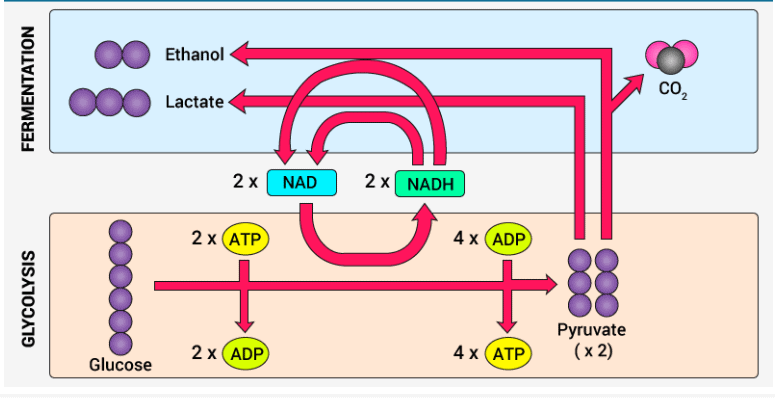
- It also includes glycolysis which takes place in the cytoplasm. During this process, one molecule of glucose is degraded into two molecules of pyruvic acid (pyruvate) and little energy (2 ATP).
- The Pyruvic acid is further oxidised into ethyl alcohol (ethanol) or lactic acid.
Table: Differences Between Aerobic and Anaerobic Respiration
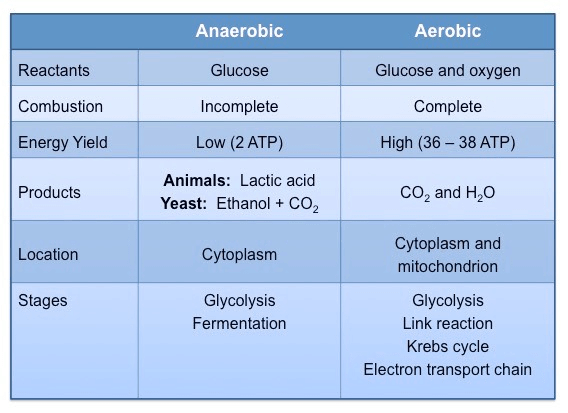
Breathing
The process involving intake of air or oxygen [inhalation] and removal of air or carbon dioxide [exhalation] is called breathing. No enzymes are involved in this process.
Difference between Breathing and Respiration
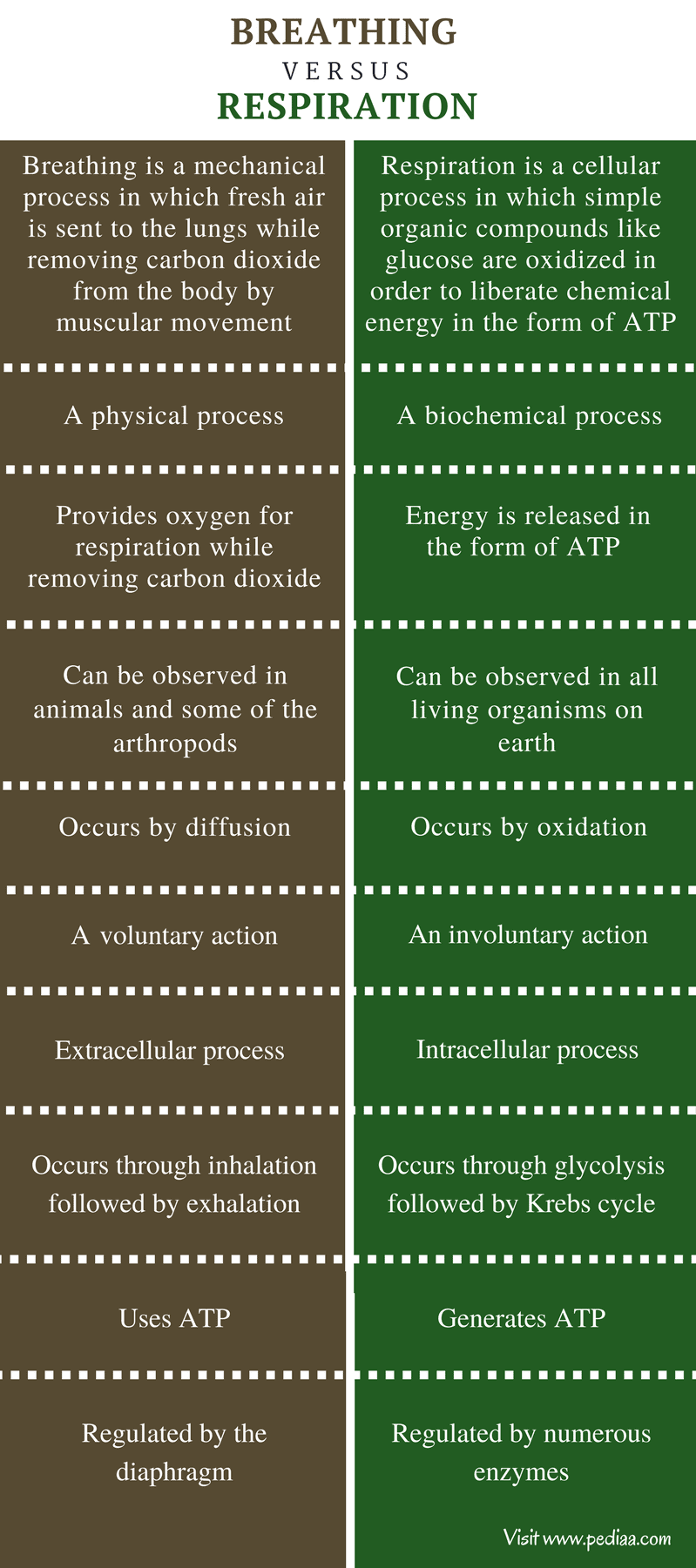
Activity
To study the release of carbon dioxide during exhalation.
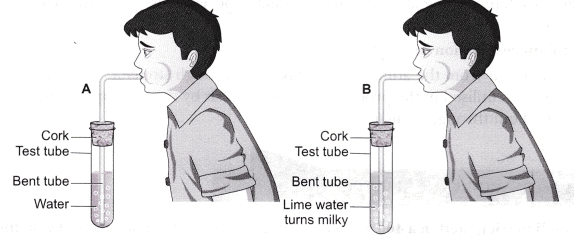
- Take a hard glass test tube.
- Fill 3/4 of this tube with freshly prepared lime water.
- Close the mouth of the test tube with a cork having a thin hole.
- Insert one thin glass tube through cork up to the bottom of the test tube.
- Make the apparatus airtight. Now breathe out air from the mouth in the test tube through the glass tube.
- We will observe that on exhaling through the tube, the lime water turns milky. This proves that exhaled air contains CO2.

Respiratory Substrates
- In respiration, many types of high-energy compounds are oxidised. These are called respiratory substrates and may include carbohydrates, fats and proteins. Of these, carbohydrates such as glucose, fructose (hexoses) sucrose (disaccharide) are the main substrates.
- Hexoses are the first energy-rich compounds to be oxidised during respiration.
- Complex carbohydrates are hydrolysed into hexose sugars before being utilized as respiratory substrates.
- Under certain conditions (mainly when carbohydrate reserves have been exhausted) fats are also oxidised. In the absence of carbohydrates and fats, proteins also serve as respiratory substrates.
- Blackman termed the respiratory oxidation of carbohydrates as floating respiration and that of protoplasmic protein as protoplasmic respiration.
Respiration and Combustion
- Combustion of wood, coal, paper, etc., are also oxidation processes like respiration which also involve the release of energy in the form of heat. But respiration and combustion differ in many fundamental features.
- Oxidation of carbohydrates during respiration is not a single reaction because there is no enzyme that can catalyze the complete oxidation of glucose into carbon dioxide and water in a single step. Instead, the oxidation of glucose consists of a sequence of reactions.
- In such stepwise oxidation, energy is released slowly. It allows cells to capture more energy than would be possible if the energy is released in one big burst.
Table: Differences Between Respiration and Combustion
Fermentation
- Fermentation is a kind of anaerobic respiration, carried out primarily by fungi and bacteria.
- A special feature of fermentation is that the substrate lies outside the cell in a liquid medium. Literally, fermentation refers to a chemical change accompanied by effervescence.
- In fermentation anaerobic breakdown of carbohydrates and other organic compounds occur and form alcohol, organic acids, gases, etc.
Glucose

 Ethanol+ CO2 +
Ethanol+ CO2 + 
- In certain bacteria and parasitic worms (Ascaris, tapeworm), glucose is metabolized to lactic acid without the use of O2 and without the formation of CO2.
- In human beings, anaerobic respiration occurs in certain tissues such as RBC's of mammals and skeletal muscles.

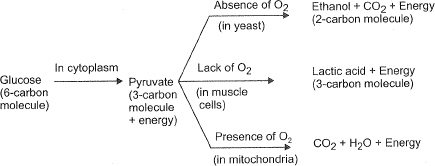 Breakdown of Glucose by Various Pathways (Aerobic and anaerobic respiration)
Breakdown of Glucose by Various Pathways (Aerobic and anaerobic respiration)
Table: Differences Between Respiration and Fermentation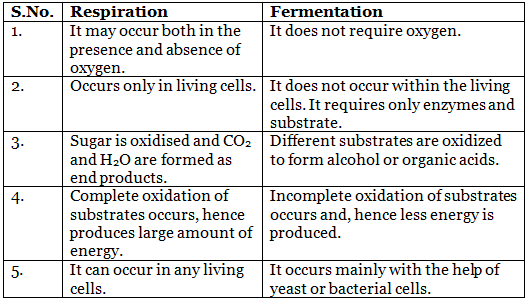
Table: Comparison Between Oxidative Phosphorylation and Photophosphorylation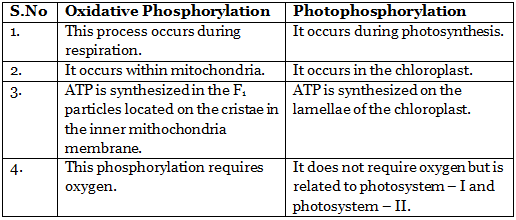
Experiment
Aim: To Demonstrate the Process of Fermentation
Method:
- Take some fruit juice or sugar solution in a test tube and add some yeast into it.
- Close the opening of the test tube with a one-holed cork.
- Insert a bent glass tube in the cork and dip the other end of the tube into the other test tube containing lime water (solution of calcium hydroxide).
- Observe after few hours.
Observation and Conclusion:
- The lime water turns milky.
- This shows that CO2 is liberated from the mixture of sugar solution and yeast.
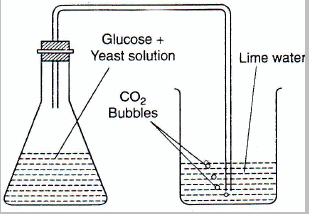 Fermentation of sugar results in the production of ethyl alcohol and CO2.
Fermentation of sugar results in the production of ethyl alcohol and CO2.
Organs of Respiration
- Skin or general body surface, as in earthworm.
- Air tubes or trachea, as in insects (grasshopper, cockroach, housefly)
- Gills as in aquatic animals like fish and prawn.
- Lungs as inland animals like frog, lizard, birds, rat, humans.
- Frog respires through skin as well as lungs (being amphibious).
- It is worth noting that all respiratory organs, whether skin, trachea, gills or lungs, have these common features.
► All the respiratory organs have a large surface area so as to get enough oxygen.
► All have thin walls for easy diffusion and exchange of respiratory gases.
► The respiratory organs like the skin, gills and lungs have a rich blood supply to transport gases. In the tracheal system, air reaches cells directly, and blood plays no role in the transport of gases. - As a medium, water is less suitable for respiration in comparison to air. Water is denser (about 1000 times) than air, and thus more energy is needed in passing it over the respiratory surface.
- Also, since solubility of oxygen is very low in water, under similar conditions, a given volume of water contains less amount of oxygen in comparison to same volume of air which contains more oxygen.
- Another problem faced in aquatic environments is that less oxygen is available in water as the temperature increases. Warm water contains less oxygen. However, as the temperature increases, the rate of respiration increases and the animal requires more oxygen to meet with the metabolic demand.
- Just as the animals in aquatic habitats have developed adaptations to tide over the problems, the terrestrial animals also have to adapt to the problems such as protection to the respiratory surface from dryness and maintaining the respiratory surface always moist.
- The air has an evaporative power, and the air-breathing land animals lose plenty of water by evaporation from the respiratory surface.
- (a) Respiration through gills – Bronchial respiration
(b) Respiration through skin – Cutaneous Respiration
(c) Respiration through Lungs – Pulmonary Respiration - Respiratory organs in frogs:
(i) Skin
(ii) Bucco-pharyngeal cavity
(iii) Lungs
Table: Differences Between Respiration in Plants And Animals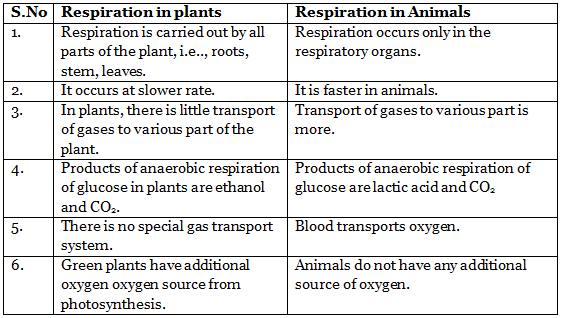
Table: Differences Between Photosynthesis and Respiration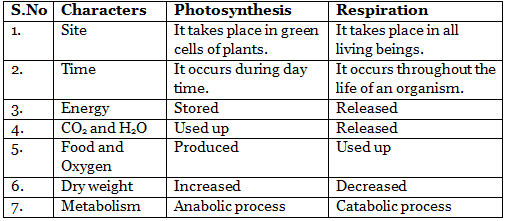
Q.1. What advantage does a terrestrial organism have over an aquatic organism with regard to obtaining oxygen for respiration?
Ans. Terrestrial animals breathe the oxygen in the atmosphere, but animals that live in water such as fishes need to use the oxygen dissolved in water.
Since the amount of dissolved oxygen is fairly low compared to the amount of oxygen in the air, the rate of breathing in aquatic organisms is much faster than that seen in terrestrial organisms.
Q.2. What are the different ways in which glucose is oxidized to provide energy to various organisms?
Ans:
- In all organisms, the first step in which glucose is oxidized is the breakdown of glucose, a six-carbon molecule, into a three-carbon molecule called pyruvate. This process takes place in the cytoplasm.
- The fate of pyruvate depends upon the presence or absence of oxygen. Pyruvate may be converted into ethanol and carbon dioxide in the absence of oxygen. This process takes place in yeast during fermentation. It is called anaerobic respiration.
Q.3. Compare the functioning of alveoli in the lungs and nephrons in the kidneys with respect to their structure and functioning.
Ans. Both alveoli in the lungs and nephrons in the kidneys possess a network of blood capillaries. The exchange of gases takes place in alveoli, where impure blood (deoxygenated blood) is purified into oxygenated blood. Similarly, the nephrons purify the blood by filtering out its waste products in the form of urine.
Q.4. What is the difference between emphysema and asthma?
Ans. Emphysema is caused by the gradual breakdown of the thin walls of the alveoli so that the air spaces become larger and the total gaseous exchange takes place. Asthma is a form of difficult or heavy breathing caused by a spasm of smooth muscle in the walls of the bronchioles.
|
80 videos|569 docs|80 tests
|
FAQs on Aerobic & Anaerobic Respiration - Science Class 10
| 1. What is the difference between respiration and breathing? |  |
| 2. What is the difference between aerobic and anaerobic respiration? |  |
| 3. What are respiratory substrates? |  |
| 4. How is fermentation related to respiration? |  |
| 5. What is the purpose of the aerobic and anaerobic respiration experiment? |  |

















